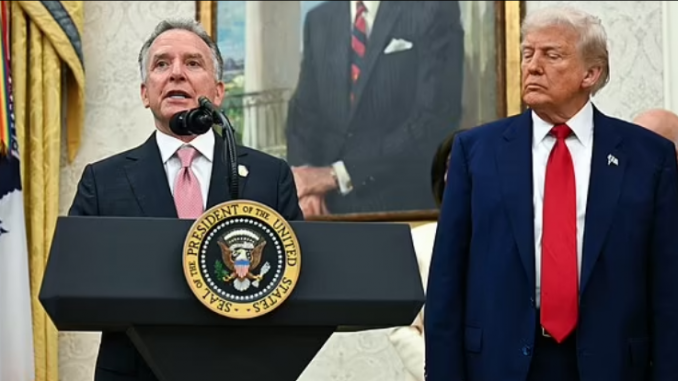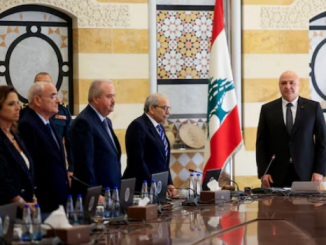
In a dramatic development, the terror group submitted its counterproposal to a framework drawn up by Steve Witkoff, President Donald Trump ‘s special envoy to the Middle East (pictured left)
| Published June 2, 2025
In a tense and rapidly evolving situation in the Middle East, recent developments surrounding the Israel-Hamas conflict reveal both fragile hope for peace and urgent humanitarian concerns.
Hamas Offers Israeli Hostages for Prisoner Swap
Hamas, the Palestinian militant group controlling Gaza, has publicly pledged to release Israeli hostages in exchange for Palestinian prisoners held by Israel. This move signals a possible breakthrough in one of the most emotionally charged aspects of the conflict.
According to reports from the Daily Mail and ABC News, Hamas leaders are seeking amendments to a U.S.-backed ceasefire proposal, which they argue does not sufficiently address their demands for the release of Palestinian detainees. The group insists that the release of hostages must be a core part of any ceasefire deal. The details remain vague, but the promise of freeing Israeli captives could represent a rare diplomatic opening in an otherwise intractable conflict.
International Efforts and Ceasefire Negotiations
The United States and regional powers have been mediating ceasefire talks with the aim of halting the violence that has devastated Gaza and Israel. Politico reports that while Israel has shown some willingness to consider a ceasefire, it remains adamant about security guarantees and a clear framework to prevent future attacks.
Hamas, meanwhile, has voiced frustration with the current ceasefire drafts, viewing them as biased and insufficient. The group’s demand to include a robust prisoner exchange component reflects broader challenges in reaching an agreement that satisfies all parties.
Humanitarian Crisis in Gaza Worsens Amid Aid Delays
As diplomatic efforts continue, the humanitarian situation in Gaza deteriorates sharply. Reuters highlights that aid shipments intended for civilians have been plagued by looting and delays, hampering the delivery of critical supplies such as food, water, and medicine.
The blockade and ongoing hostilities have left Gaza’s population in dire need, with health facilities overwhelmed and infrastructure severely damaged. International agencies warn that without immediate and secure aid access, the humanitarian crisis could deepen, compounding the suffering of thousands.
The Road Ahead: Fragile Peace or Prolonged Conflict?
The promise of a hostage release by Hamas could serve as a key confidence-building step, potentially paving the way for a ceasefire. However, deep mistrust, political complexities, and security concerns make the path forward precarious.
Both sides face intense domestic pressures and international scrutiny, with civilian lives hanging in the balance. Whether the competing demands over prisoner releases and ceasefire terms can be reconciled remains to be seen.
For now, the world watches closely as negotiators attempt to transform promises into lasting peace — or risk further escalation.

Palestinians inspect the rubble following Israeli strikes on the al-Qattaa family home in al-Tuffah neighbourhood in Gaza City on May 31, 2025

Smoke rises after an Israeli attack hit a house of Palestinian family near al Ahly Hospital in Gaza City, Gaza on May 31, 2025
Here are the implications of the current developments in the Israel-Hamas conflict, based on the feature article and sourced reports:
1. Potential Diplomatic Breakthrough
The willingness of Hamas to release Israeli hostages in exchange for prisoners signals a rare moment of diplomatic leverage. If mediated effectively, this could lay the groundwork for a phased ceasefire and perhaps even a longer-term negotiation framework. However, the success depends heavily on whether both sides can agree on the sequencing and terms.
2. Pressure on U.S. and Mediators
The U.S.-backed ceasefire proposal is now under scrutiny from all parties. Hamas’ push for amendments reveals a perceived imbalance in the current draft. The Biden administration, already balancing support for Israel with calls for restraint, may face intensified pressure to mediate more inclusively or risk losing credibility as a neutral broker.
3. Increased Civilian Vulnerability
With Gaza aid supplies looted and blocked, the civilian population is bearing the brunt of political deadlock. If ceasefire talks stall, humanitarian conditions could spiral into catastrophe, risking wider regional condemnation and potential intervention from international bodies or neighboring states.
4. Domestic Reactions and Political Fallout
Both Israeli and Palestinian leaders risk backlash from their own constituencies. For Israel, agreeing to a ceasefire without securing all hostages or achieving clear military goals may be seen as weakness. For Hamas, too many concessions without full prisoner releases or an end to blockades could erode internal support.
5. Regional and Global Ripple Effects
Other actors like Iran, Egypt, Qatar, and even Hezbollah are closely watching the outcome. A successful exchange could reset regional dynamics temporarily, while a breakdown in talks might provoke renewed hostilities or wider conflict. It also affects global diplomacy, particularly with U.S. elections nearing and international opinion shifting due to prolonged civilian suffering.

Smoke billows following Israeli strikes on al-Tuffah neighbourhood in Gaza City on May 31, 2025

The White House said on May 29 that Israel had ‘signed off on’ a new Gaza ceasefire proposal submitted to the Palestinian Hamas movement, which confirmed it was studying the deal
Overall Takeaway:
The latest developments in the Israel-Hamas conflict mark a critical juncture: Hamas’ offer to release hostages in a prisoner exchange introduces a glimmer of hope amid ongoing violence and diplomatic stalemate. However, deep distrust, contested ceasefire terms, and a worsening humanitarian crisis in Gaza threaten to undermine progress. While the talks present a potential opening for peace, the path forward remains highly fragile — and the consequences of failure could be devastating for both sides and the broader region.





Be the first to comment